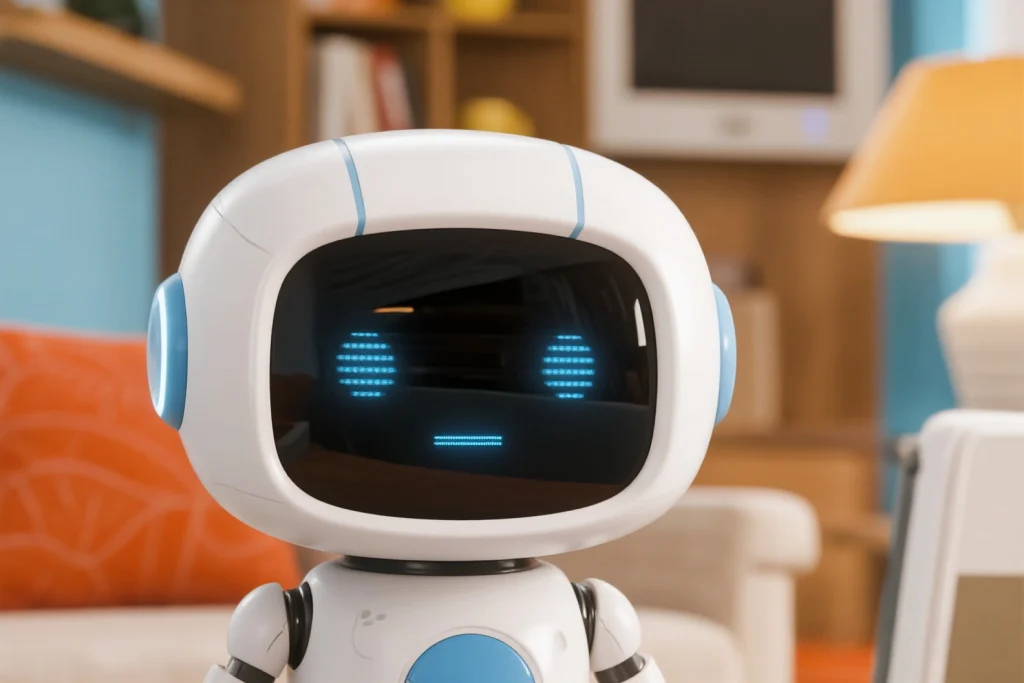When it comes to Educational AI Robots for Kids in 2025, two names dominate the conversation: Roybi y Miko 4. These smart robots are not only adorable, but they also offer advanced learning systems, emotional interaction, and language capabilities. If you’re a parent trying to choose the right AI robot for your child, this deep dive comparison will help you decide.
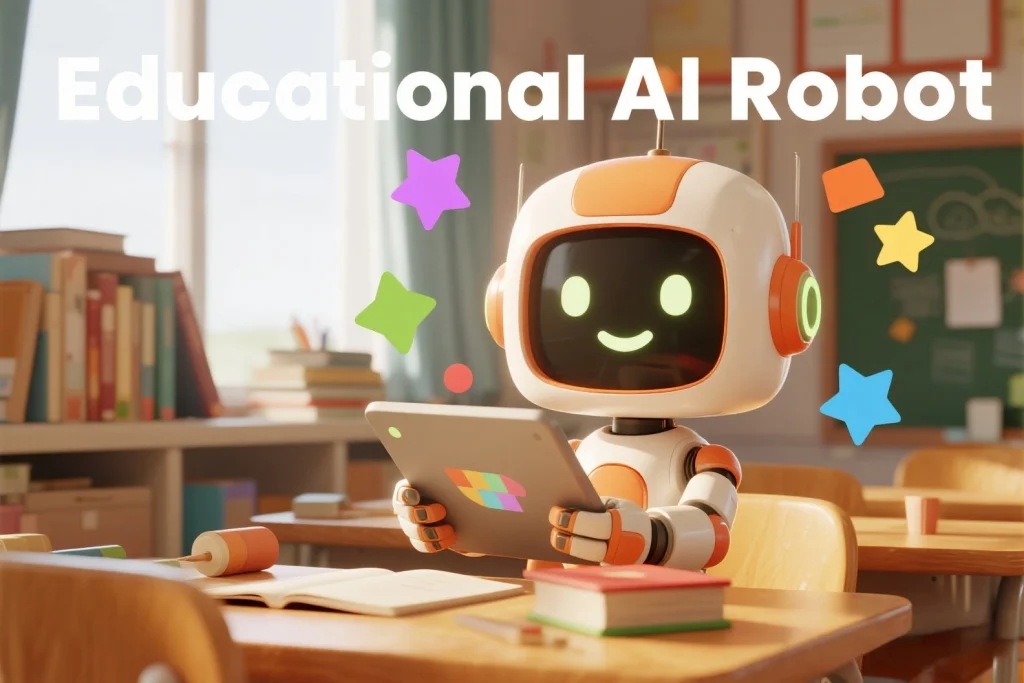
Quick Comparison Table – Roybi vs Miko 4
| Característica | Roybi | Miko 4 |
|---|---|---|
| Precio | $199–$249 | $249–$299 |
| Edad recomendada | 3–7 years | 5–12 years |
| Educational Content | Multilingual (English, Spanish, Mandarin), STEM, AI conversations | Emotional intelligence, general knowledge Q&A |
| Voice Recognition | Sí | Sí |
| Camera | Sí | Sí |
| WiFi Connectivity | Sí | Sí |
Roybi Robot – Key Features and Strengths
Roybi is one of the first Educational AI Robots for Kids developed specifically for educational use in young children. It’s designed with early language development, STEM learning, and emotional support in mind.
- Expert-Curated Curriculum: Roybi features over 500+ lessons created by educators in subjects like science, technology, math, and early literacy. The lessons are broken into short, digestible formats.
- Multilingual Support: One of its standout features is its ability to teach in multiple languages, including English, Spanish, and Mandarin Chinese, making it ideal for bilingual learning.
- Daily Learning Reports: Parents receive reports on what their child has learned, how they engaged, and what areas need more focus.
- Voice & Facial Recognition: Roybi can recognize who it is talking to, personalize lessons based on learning pace, and react to facial expressions.
- Offline Access: Once synced, children can continue lessons without needing a constant internet connection.
- Safe and Privacy-Focused: Roybi is designed with strict data protection measures, reassuring parents about children’s privacy.
- Encourages Early Learning Habits: With a reward-based system, children are motivated to keep learning through achievements and badges.
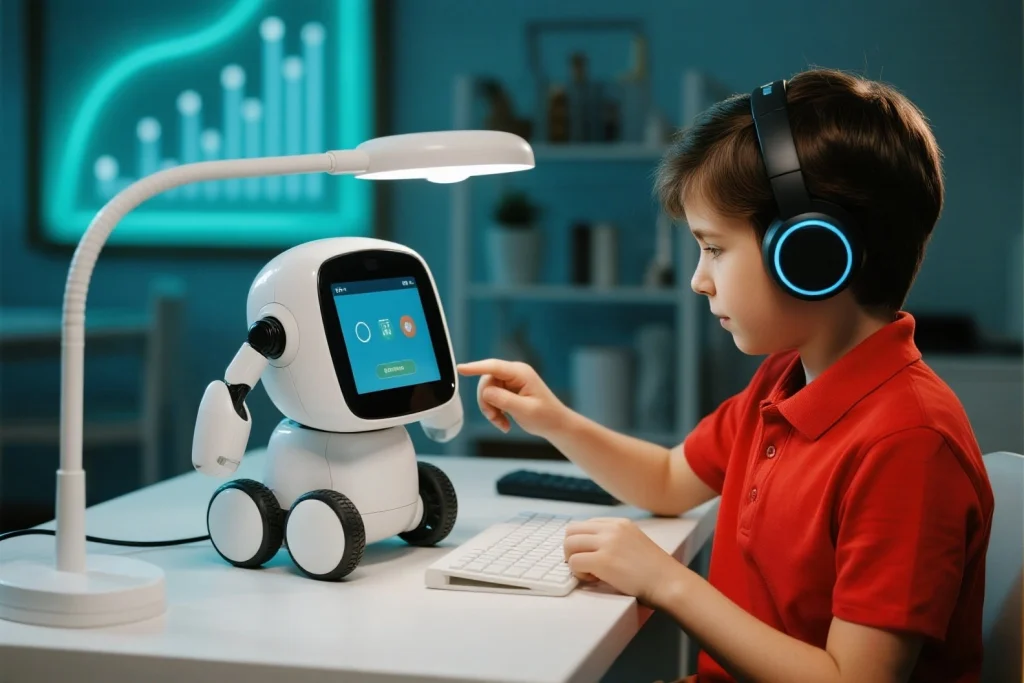
Miko 4 Robot – Highlighted Features
Miko 4 is a more emotionally intelligent robot designed for slightly older kids. While still educational, it places more emphasis on emotional interaction, natural dialogue, and creative engagement.
- Conversational AI Engine: Miko can hold dynamic conversations with children. It understands context, tone, and can even mirror emotions.
- Emotional Bonding: Unlike Roybi, Miko adds personality. It reacts with smiles, head tilts, blinking eyes, and can even mimic human expressions.
- Global Content Library: Offers a wide range of games, stories, quizzes, and videos from global partners.
- Remote Control App: Parents can use the app to control what content the child consumes and monitor their interactions.
- Real-Time Learning Updates: Miko evolves based on the child’s interests and adapts the conversation accordingly.
- Facial Recognition and Mood Detection: The robot adjusts its responses based on your child’s facial expressions and mood.
- Subscription Options for More Content: While it offers free features, Miko can be upgraded with a subscription that unlocks more educational content.
- Parental Insights Dashboard: Detailed analytics show how your child is interacting with the robot and what they’re learning.
✦ Data Privacy & Parental Control – Who Keeps Your Child Safer?
When it comes to smart toys designed for children, data privacy is non-negotiable. Parents are increasingly aware of how Educational AI Robots for Kids gather and use information.
Roybi: Strict FERPA & COPPA Compliance
Roybi has consistently promoted its compliance with child safety standards like COPPA (Children’s Online Privacy Protection Act) and FERPA (Family Educational Rights and Privacy Act). It stores data securely on encrypted cloud systems and provides parental dashboards that allow real-time review of stored content. Parents can delete recordings, control what content is accessible, and even pause AI interactions remotely.
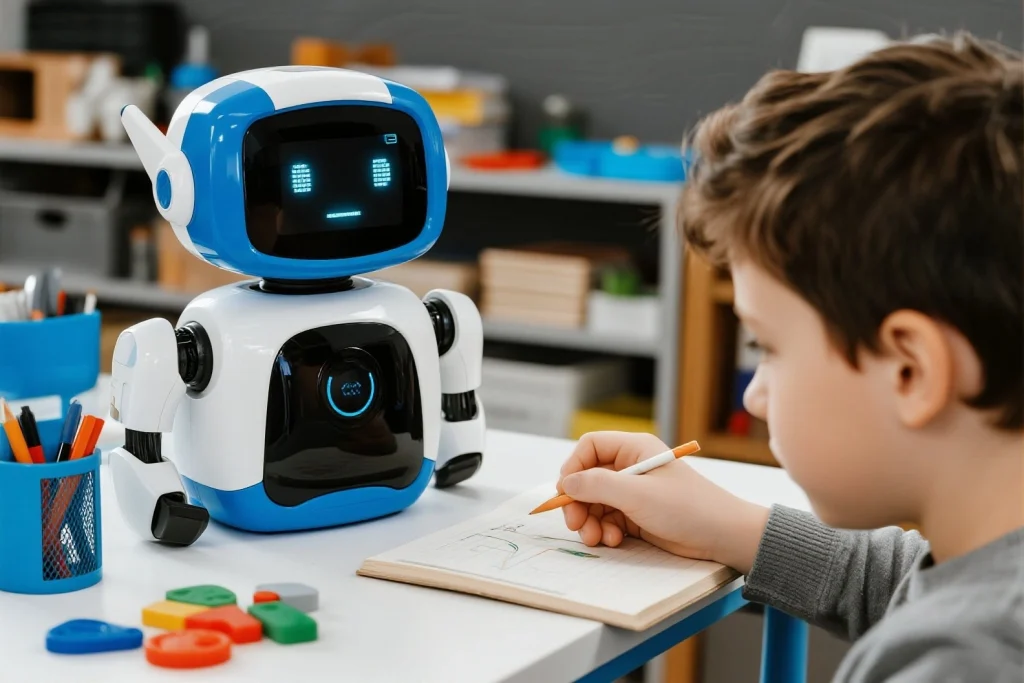
Miko: Safe-Mode & GDPR Alignment
Miko, while not U.S.-based, aligns its privacy policies closely with GDPR, offering opt-in systems, customizable data sharing, and regional server hosting. Their “Safe Mode” ensures that no conversations are stored unless explicitly approved. The Miko Parent App gives full access to manage voice data, app access, screen time, and more.
Verdict: For privacy-conscious parents, both are strong choices, but Roybi’s stricter U.S. regulation alignment may offer added peace of mind in North America.
✦ Customization and Curriculum Flexibility
A key deciding factor for many parents is how flexible and customizable the learning experience is.
Roybi: AI-Powered Individualized Learning
Roybi adapts its learning paths based on your child’s responses. If your child struggles with a particular topic, Roybi’s algorithm adjusts and repeats with tailored formats—videos, songs, stories. Parents can also upload their own content (e.g., family pictures or custom vocabulary words), enhancing engagement.
Miko: Interactive Modules with Third-Party Learning Apps
Miko offers a broader ecosystem with integration from partners like Lingokids, Da Vinci Kidsy Out of the Box. This allows for multidisciplinary learning—from math to emotional intelligence. You can subscribe to specific modules and limit others, giving more control over your child’s screen time.
Verdict: If you’re looking for a robot that grows organically with your child and allows family-based content, Roybi leads. But if you want pre-packaged diversity and third-party learning add-ons, Miko has the edge.
✦ Language Support – Who’s More Global?
In 2025, language learning has become a priority for many parents. Whether you’re raising a bilingual child or living in a multilingual environment, your robot’s capabilities matter.
Roybi: Best for Early Multilingual Learners
Roybi comes preloaded with 70+ languages, including less common ones like Tagalog and Arabic. The AI adjusts pronunciation based on the child’s native language, making it ideal for non-English-first homes o international families.

Miko: Stronger Conversational AI in English
Miko focuses more on natural conversation AI. Its fluency and response in English, Spanish, and Hindi are excellent, but its range beyond that is still growing. For deep language learning, Miko offers add-on apps, but they come at extra cost.
Verdict: For sheer multilingual content and immersion, Roybi takes the crown. Miko excels in fluent and emotional English responses, but is still building its global language library.
✦ Community, Support & Updates
Buying an AI robot isn’t just about hardware—it’s also about the ecosystem, support, and long-term usage.
Roybi: Parent-Teacher Community Forums
Roybi hosts an active parent-teacher forum, where users share lesson plans, feedback, and modifications. The company also pushes monthly OTA (over-the-air) updates, ensuring your robot is always up-to-date with the latest educational standards.
Miko: Gamified Progress & Global Family Network
Miko offers a more gamified community experience. Your child can complete weekly learning “quests” and compare scores with other users around the world. Their customer support is 24/7 with WhatsApp, live chat, and in-app help, which is a huge plus for international buyers.
Verdict: For community and support, Miko wins with its global gamified ecosystem. Roybi remains focused on education-first communities, which may appeal more to teachers and homeschooling parents.
✦ 2025 Market Trends & Growth Potential
How do Roybi and Miko fit into the bigger picture of 2025’s AI-powered education market?
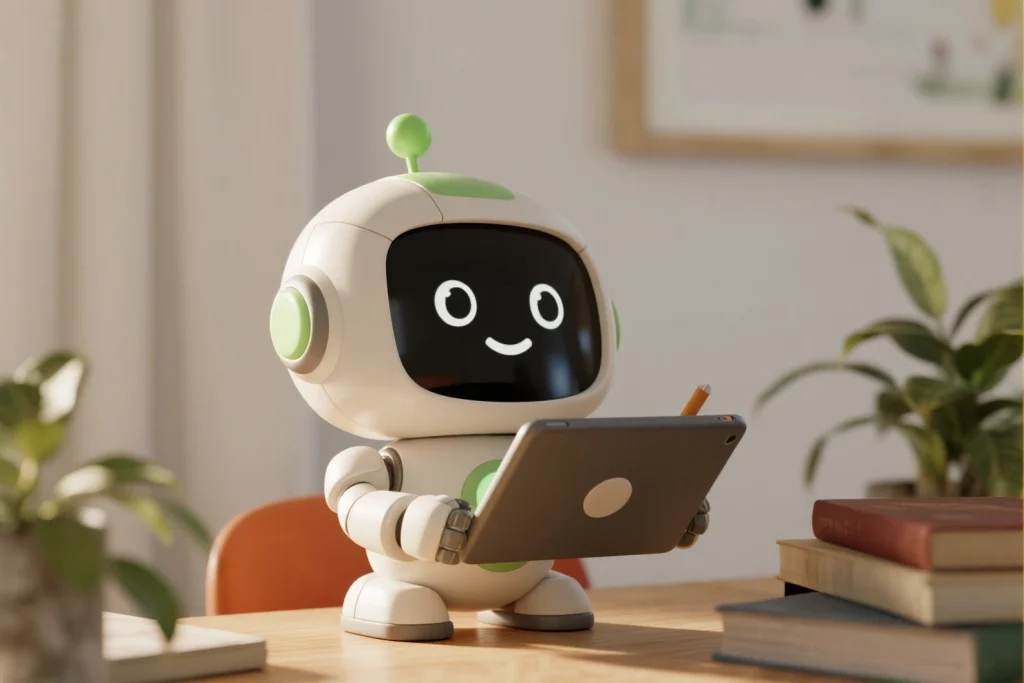
Roybi: B2B Partnerships & Curriculum Certifications
In 2025, Roybi expanded beyond households into schools, preschools, and therapy centers. With partnerships in U.S., UAE, and Japan, it’s now considered a certified AI-based ESL (English as Second Language) solution, used officially by educational institutions.
Miko: Moving Toward Emotional AI & Teen Use
Miko has recently released research trials into adapting its robot for early teens, extending beyond the 5–10-year range. They’ve also begun to introduce emotional intelligence AI, allowing children to recognize feelings and empathize through interactive scenarios.
Verdict: Roybi is becoming the classroom choice, while Miko is becoming the at-home emotional tutor—both evolving into distinct but critical roles in child development.
✦ Final Comparison Table (Extended)
| Característica | Roybi Robot | Miko 3 Robot |
|---|---|---|
| Age Group | 3–8 years | 5–12 years |
| Languages Supported | 70+ languages | 8 languages |
| Content Sources | In-house AI + Parent Content Upload | Partner Apps + In-house |
| Educational Focus | Academic + Language Learning | STEM + Emotional Intelligence |
| Protección de datos | COPPA + FERPA Compliant | GDPR Aligned + Safe Mode |
| Control de aplicaciones | Full Parental Dashboard | Miko Parent App with Screen Time Controls |
| Hardware Features | Display + Camera + Microphone | Display + Microphone (no camera) |
| Customizability | High (Upload content, select lessons) | Moderate (Pre-set Apps, Subscription Modules) |
| Gamification | Minimal | Strong (Quests, Rewards, Leaderboards) |
| OTA Updates | Monthly + Security Patch | Regular Updates via App |
| Community | Parent-Teacher Learning Forums | Global Kid Network + Gamified Events |
| Price (2025 Average) | ~$219 | ~$249 |
✦ Recommended Usage Scenarios in 2025
| Scenario | Best Pick | Reason |
|---|---|---|
| Bilingual Toddler | Roybi | Offers extensive language support and early literacy modules |
| STEM-Focused Elementary Schooler | Miko | Offers interactive science and math modules via third-party content |
| Homeschool Setup with Parental Involvement | Roybi | Flexible content input and curriculum control |
| Emotional Development for Sensitive Kids | Miko | Emotional AI modules foster empathy and self-awareness |
| Parents Concerned About Screen Addiction | Roybi | Less gamification, more structured learning |
✦ Internal Links for Further Reading on didiar.com:
- Los 10 mejores regalos de robots para niños
- AI Robots for Kids – How to Choose the Right One
- Best Emotional AI Robots for Kids in 2025
- Best Smart Robot Gifts in 2025
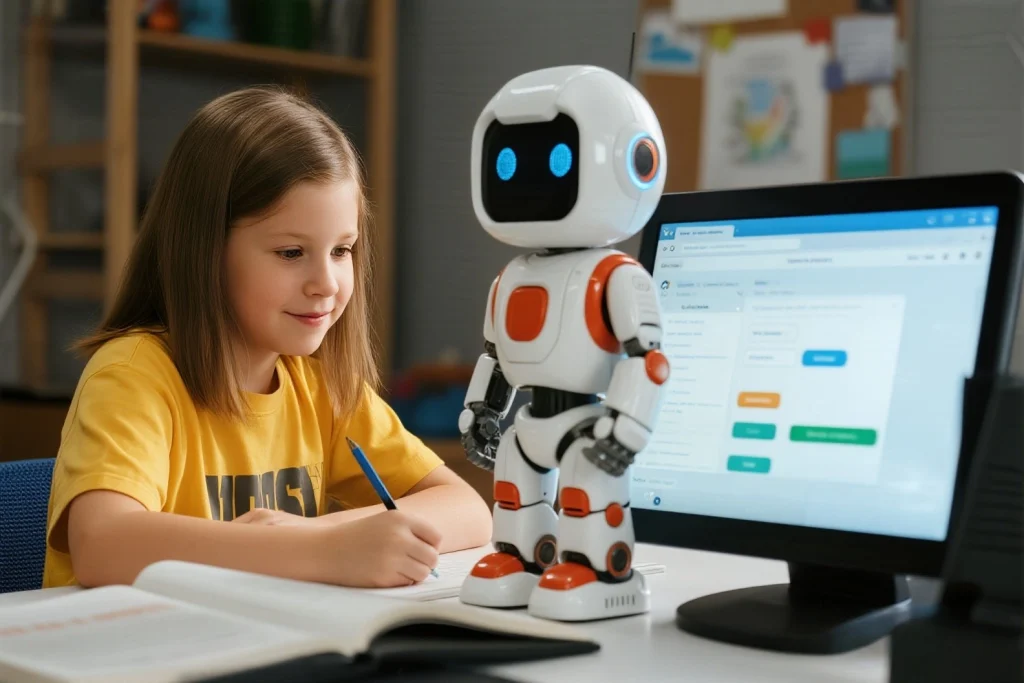
Price Comparison – Roybi Robot Price Breakdown
- Roybi: Prices typically range from $199 to $249, depending on the bundle. Some platforms may offer refurbished models or education-focused packages.
- Miko 4: Starts around $249 but may go up to $299 with additional subscriptions or accessories.
Which is more cost-effective? While Roybi may have a lower starting price, Miko offers longer usability thanks to its higher age range and evolving emotional features. However, Roybi doesn’t require additional subscriptions for most features, making it more budget-friendly in the long run.
What Parents Are Saying – Real Feedback
- “Roybi helped my 4-year-old improve her vocabulary and basic math. The daily report is a game-changer.”
- “Miko feels like a real friend to my son. He talks to it like it’s a sibling and learns trivia without realizing it.”
- “We chose Roybi for bilingual learning, but later added Miko when my child turned 6. They both serve different stages of development.”
- “Miko keeps my 8-year-old engaged for hours. The emotional responses make it feel less like a machine and more like a buddy.”
Target Audience Recommendations
- Ages 3–5: Roybi is better suited for foundational learning, first words, and gentle structure.
- Ages 6–10: Miko provides richer content and emotional feedback. It’s ideal for kids already comfortable with tech.
- For Bilingual Learning: Roybi wins with its multilingual lessons.
- For Emotional Interaction: Miko excels with its personality-driven AI.
- For Non-Tech-Savvy Families: Roybi’s setup and navigation are simpler and more intuitive.
Hands-On Experience – Which Feels Better to Use?
- Interaction: Miko is more conversational and responsive in real time.
- Setup: Roybi is slightly easier to set up, especially for non-tech-savvy parents.
- Content Updates: Both receive updates, but Miko’s app makes it easier to manage and customize.
- Interfaz de usuario: Miko has a more modern, touchscreen-like interface, whereas Roybi uses a more traditional button-based interface.
- Duración de la batería: Roybi tends to last longer per charge, while Miko requires more frequent charging if used extensively.
How to Choose the Right Educational AI Robots for Kids
If you’re still torn between the two, consider what your child needs:
- Elija Roybi if you want a structured, educational-focused tool with multilingual support.
- Go for Miko if you’re looking for an emotionally responsive friend with learning disguised as fun.
Ask yourself:
- Is language learning a priority? → Roybi
- Does your child love interactive conversations? → Miko
- Are you working with a tighter budget? → Roybi
- Do you want longer usability as your child grows? → Miko
Discover More AI Robots for Kids
- Los 10 mejores regalos de robots para niños
- AI Robots for Kids – Smart Choices in 2025
- Los 7 mejores robots emocionales con inteligencia artificial para niños
Preguntas más frecuentes (FAQ)
What is the price of Roybi robot?
Roybi typically costs between $199 and $249 depending on the bundle and seller.
Does Miko robot require subscription?
Miko offers basic features without a subscription, but premium content and learning packs require an active plan.
Which robot is better for bilingual learning?
Roybi is the better choice due to its built-in multilingual lessons in English, Spanish, and Mandarin.
Can both robots be used offline?
Roybi offers limited offline use once synced. Miko needs an active connection for most features.
Are these robots safe for kids?
Yes. Both Roybi and Miko meet child safety and privacy standards. Roybi is especially focused on education without ads.
Want to explore more affordable options? Check out our Los mejores robots de IA por menos de 100 article for budget-friendly picks.
Todas las marcas comerciales, nombres de productos y logotipos de marcas pertenecen a sus respectivos propietarios. didiar.com es una plataforma independiente que ofrece opiniones, comparaciones y recomendaciones. No estamos afiliados ni respaldados por ninguna de estas marcas, y no nos encargamos de la venta o distribución de los productos.
Algunos contenidos de didiar.com pueden estar patrocinados o creados en colaboración con marcas. El contenido patrocinado está claramente etiquetado como tal para distinguirlo de nuestras reseñas y recomendaciones independientes.
Para más información, consulte nuestro Condiciones generales.
:AI Robot Tech Hub " Roybi contra Miko: el enfrentamiento definitivo de 2025 de robots educativos con inteligencia artificial para niños

 AI Robot Tech Hub
AI Robot Tech Hub



